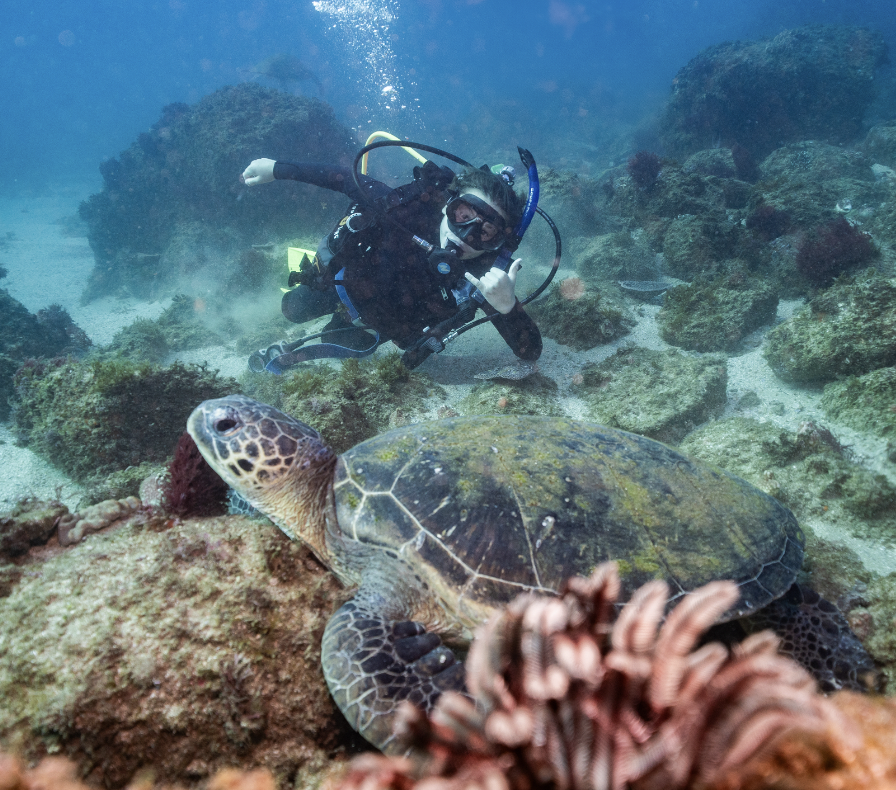A Ripple of Change
Words Sarah Jantos & Kristie Morgan
The past couple of months have been idyllic in the waters of the Tweed and surrounding ocean. With visibility of up to 30M it has been paradise in and on the sea for water enthusiasts including, fisherman, swimmers, surfers, snorkellers, divers and whale watchers just to name a few.
A recent, global dive blog listed Cook Island Aquatic Reserve as #7 on the ‘Top 13 Places in the World to Snorkel with Turtles’ highlighting a recent increase in visitors who enter our waters to interact with a gentle and ancient member of our community – the majestic sea turtle.
Research into paid animal encounters highlights that the motives of paying customers or casual visitors are often genuine. According to the World Animal Protection Organisation, most people who pay for
animal encounters have a pure interest in learning about the species or a genuine endearment to the animal that they are paying to see. Other research suggests that following up-close animal encounters, individuals were more likely to make lifestyle changes and engage in targeted conservation efforts. Of the many wildlife experiences available, non captive wildlife encounters impacted on individual behaviour the most.
As stewards of this stunning coastal environment, it is our collective, community responsibility to ensure the safety and wellbeing of these magnificent creatures. In a bid to uphold this duty, we are proud to announce the launch of our new Turtle Code of Conduct, a set of guidelines aimed at preserving and protecting the turtles that call these waters home.
Why Now?
The waters of the Tweed are home to 3 of the 7 species of sea turtles that inhabit the world’s oceans. These are the green turtle, the loggerhead turtle and the hawksbill turtle. All marine turtle species occurring in Australian waters are listed on Appendix I of the Convention on International Trade in Endangered Species of Wild Fauna and Flora (CITES ). This means that these species are considered to be threatened with extinction and are given the highest level of protection.
With increasing human activity in our coastal areas, waterways and our local aquatic reserve, the delicate balance of marine ecosystems is under threat. Sea turtles, in particular, face numerous challenges, from pollution and habitat destruction to accidental entanglement in fishing gear. The need for proactive measures to safeguard these gentle giants has never been more pressing. Minimising stress on threatened species in every way possible is crucial.
As more people flock to experience our pristine underwater habitats and marine life, the new Turtle Code of Conduct aims to minimise one significant stressor for our local turtles. In short, turtles that do not feel threatened by human company in the water, can be more resilient to other stressors or negative impacts in their daily lives.
What Does the Turtle Code of Conduct Entail?
Our Turtle Code of Conduct is a collaborative effort between community members, environmental experts, and local authorities. It outlines simple yet effective practices that promote coexistence with sea turtles and minimises human impact on their habitats.
Joining Forces for Conservation
The success of our Turtle Code of Conduct hinges on community-wide participation and commitment. By adopting these guidelines into your next aquatic adventure, we not only protect sea turtles but also safeguard the health and resilience of our local marine ecosystems for generations to come.
Get Involved
As we embark on this journey towards a more sustainable future, we invite all members of our community to join us in championing the cause of sea turtle conservation in our local waters. Help us spread awareness about our local turtle populations, or simply adhering to the principles of the Turtle Code of Conduct, every individual action makes a difference.
Together, We Make Waves
In the vast expanse of our oceans, every ripple counts. Let us unite in our dedication to preserving the natural wonders of our local waters and ensuring a brighter, safer future for sea turtles and all marine life.
Sarah and Kristie, are directors at Green Heroes for more information please go to www.greenheroes.org.au.

Top: Free diver observing a Green Turtle. Photo courtesy Nicole McLachlan.
Above; 11 year old Oliver Cairncross, of Fingal, dives at Cook Island (Jungarra Ngarrian) to demonstrate best practice of the new Turtle Code of Conduct. Photo courtesy of Leigh Edwards.

